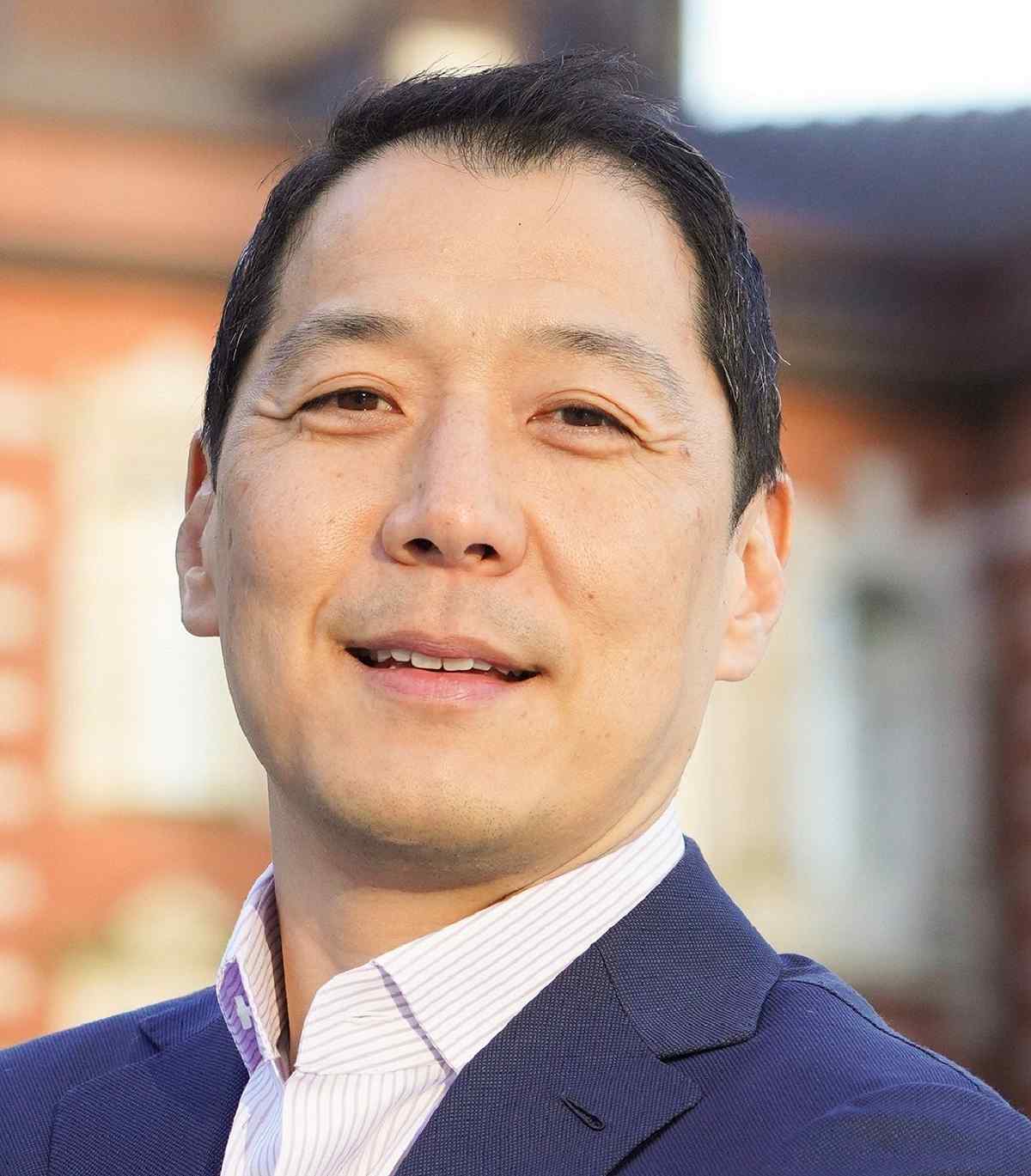Japanese Corporations, AI Startups Can Build Synergy; Both Have Qualities To Mutually Enhance Innovation

Mike Kim
12:00 JST, November 16, 2024
In February this year, I helped my client ClimateAI host a climate change wine tasting event at the Tokyo American Club in Azabudai, Minato Ward. ClimateAI is a San Francisco-based technology startup applying artificial intelligence and machine learning models to provide short- and long-term insights into weather and climate impact.
Together we invited representatives from leading Japanese companies to connect with like-minded peers interested in AI and climate while tasting an array of wines from around the world, learning about both emerging and endangered wine regions. One of the experiences was tasting Gusbourne Brut Reserve 2019, a sparkling wine from Appledore, Kent, in England.
I learned that while the United Kingdom has not been known for its sparkling wines, as the climate warms we can expect a rise in U.K. sparkling wines. This is an illustration of how climate change is altering entire industries.
ClimateAI, Suntory collaborate
Many of the ClimateAI customers at the event had come to hear Suntory’s remarks on how they are using the U.S. startup’s AI and machine-learning-based climate and extreme weather prediction model for their business. Suntory is known globally for its award-winning Japanese whiskies such as Yamazaki. Their products depend heavily on nature and weather, so the collaboration between Suntory and ClimateAI has been an important one.
Brian Golden, Head of Global Supply Solutions at Suntory, made remarks on the changing environment and the importance of sustainability. He shared how the two companies are working together in the areas of climate and procurement, and ended his comments with “Yatte Minahare!”
Yatte Minahare is a Suntory motto meaning, “We refuse to fear failure, refuse to give in or give up, and stay relentless in our quest to innovate new values.” It was inspiring to see attendees engage with Suntory’s presentation, many curious to learn more about how they are incorporating this new technology.
Suntory began using ClimateAI’s technology in mid-2023 to predict climate trends over the coming months and years, which helps them better manage their supply chains for key crops and ingredients like hops, corn, barley, sugarcane and coffee. During a virtual fireside chat hosted by ClimateAI, Suntory’s Golden shared that the company is searching for technology solutions that address a difficult problem that has large implications.
Climate risk identification, visibility of complex supply chains and shortages of raw materials are examples of areas of key focus. Golden commented that Suntory is looking for technology partners who “don’t know it all but want to” and added, “if you claim to have it all solved, I inherently don’t trust you,” emphasizing the importance of continuous evolution in their partnerships.
For me, this event symbolized a successful collaboration between a leading Japanese corporation and a pioneering U.S. startup. Both parties brought something to the table the other did not have. Regarding deploying this new and innovative technology, both companies needed each other, each filling some gaps of the other.
From my vantage point of helping U.S. AI startups expand in Japan and Asia, this type of synergy is becoming more common and essential. In many ways, I think it is a perfect match. With the continual rise of AI, we will see more foreign AI startups enter Japan.
Overseas startups eye Japan
Recently, I have noticed even more of an uptick in overseas startups being interested in Japan. Founders and CEOs of startups are increasingly reaching out, stating their interest in the Japan market and finding matching Japanese corporations for their technology.
As a global AI leader, the U.S. will continue to spin up startups that want to expand their business footprint to other regions, with Asia being a significant part of the growth strategy. Japan will be a key target market as it is one of the top buyers of U.S. technology. This is assisted by the growing U.S.-Japan alliance, with the two countries strengthening cooperation across a multitude of areas.
Japan’s increasing focus on AI and innovation is reflected in a report presented in 2020 with the support of the Japan External Trade Organization (JETRO). According to the report, Japan ranked first among all countries in the number of innovation outposts in Silicon Valley. Japanese companies are strengthening their presence in places like the San Francisco Bay Area to increase access to AI and innovation, which is critical for the country when considering its declining and aging population.
Japanese firms improve their English
Many Japanese companies are deploying budgets for numerous pilot projects with startups. One Japanese person on a digital transformation team at one of the major Japanese corporations confided in me that this year has been too busy for him because he is managing five pilot projects with startups.
One significant shift I have noticed since I began working in Japan in 2016 is the improved ability of Japanese firms to conduct business in English. This development has been key in increasing their effectiveness in working with overseas startups.
Many large Japanese companies have bilingual Japanese speakers or have hired non-Japanese employees in roles working with external parties. I have observed the gradually decreasing need for interpreters for business meetings in Tokyo over the years.
Startups rising also in Japan
The collaboration I am talking about is not limited to overseas startups. We are also seeing the rise of Japanese startups in the country. It is exciting to witness the growth in Japan of home-grown startups tackling important technology needs across a variety of industries. There are Japanese startups surfacing in the space, satellite, climate and maritime sectors.
As one example, Japanese startups are supporting the MEGURI2040 initiative for autonomous navigation of vessels to address a shortage of human resources and decrease accidents caused by human error. About 30 Japanese corporations are involved in the MEGURI2040 maritime consortium. Furthermore, some Japanese startups have successfully expanded outside of Japan and made the leap to acquire customers in the United States and other countries.
While living in Tokyo, I have also noticed a trend of foreigners selecting Japan as the location of choice for starting their companies. There has been a lot of recent publicity about Tokyo-based Sakana AI, co-founded by former Google researchers David Ha and Llion Jones. It was reported in September 2024 that the company has been valued at $1.5 billion in the latest fundraising round involving Japanese megabanks and other companies.
I see strong synergies between the large, established Japanese corporations and agile, innovative startups. While startups invent new solutions and products, they need willing customers to use the technology and validate it.
There is a great partnership where the customer uses and provides feedback on the product, which allows the startup to further improve the technology to meet customers’ needs. Developing a good product is very difficult without getting and applying that customer feedback.
Both the startup and the Japanese company bring something to the table that the other cannot. The Japanese company has the need for innovation, generally has the cash to spend on innovation and most importantly possesses the domestic or global business for the startup solution to be applied, tested and validated. The startup has the thesis and the budding early-adopter customer case studies but it needs the companies to validate that thesis.
Suntory provides ClimateAI critical validation on what is working well and feedback on what needs to be improved based on global use of the data. The Suntory-ClimateAI partnership addresses a challenging issue — climate risk. It offers a glimpse into the kind of mutually beneficial collaboration that can be possible when venturing into new domains.
As AI continues to expand its footprint in Japan, I’m excited to witness more of this type of dynamic collaboration which will allow us to push the boundaries of innovation more effectively.
***
Mike Kim is the founder of Gradient Consulting, a consultancy specializing in accelerating the Japan and Asia business for AI technology companies and startups. He has over 20 years of experience across nine countries in the Asia Pacific region and is based in Tokyo.
Top Articles in Editorial & Columns
-

Riku-Ryu Pair Wins Gold Medal: Their Strong Bond Leads to Major Comeback Victory
-

40 Million Foreign Visitors to Japan: Urgent Measures Should Be Implemented to Tackle Overtourism
-

China Provoked Takaichi into Risky Move of Dissolving House of Representatives, But It’s a Gamble She Just Might Win
-

University of Tokyo Professor Arrested: Serious Lack of Ethical Sense, Failure of Institutional Governance
-

Policy Measures on Foreign Nationals: How Should Stricter Regulations and Coexistence Be Balanced?
JN ACCESS RANKING
-

Japan PM Takaichi’s Cabinet Resigns en Masse
-

Japan Institute to Use Domestic Commercial Optical Lattice Clock to Set Japan Standard Time
-

Israeli Ambassador to Japan Speaks about Japan’s Role in the Reconstruction of Gaza
-

Man Infected with Measles Reportedly Dined at Restaurant in Tokyo Station
-

Videos Plagiarized, Reposted with False Subtitles Claiming ‘Ryukyu Belongs to China’; Anti-China False Information Also Posted in Japan
























